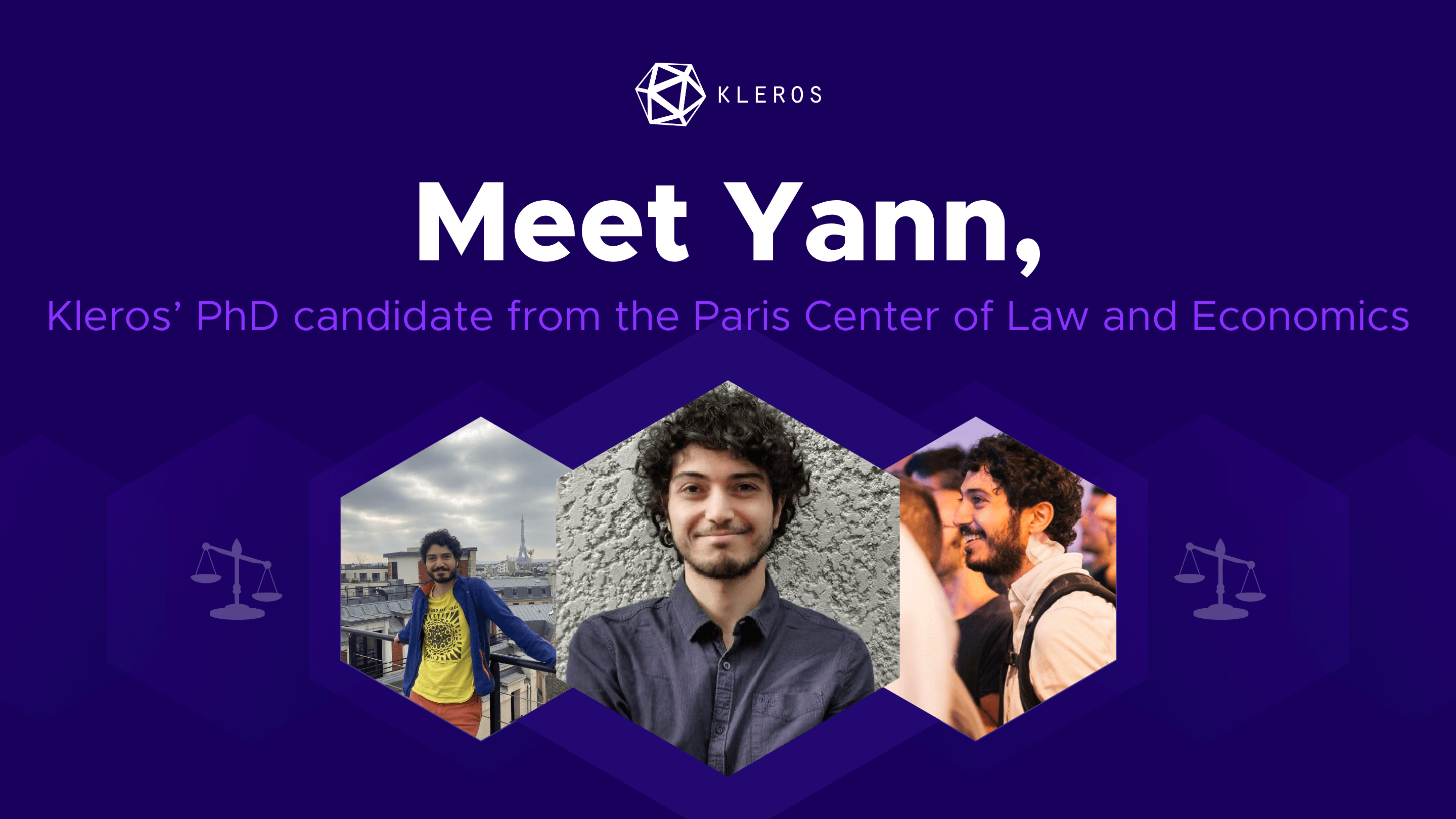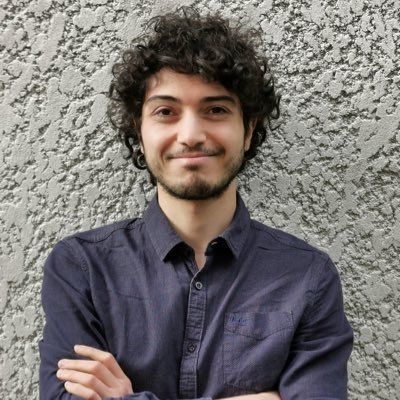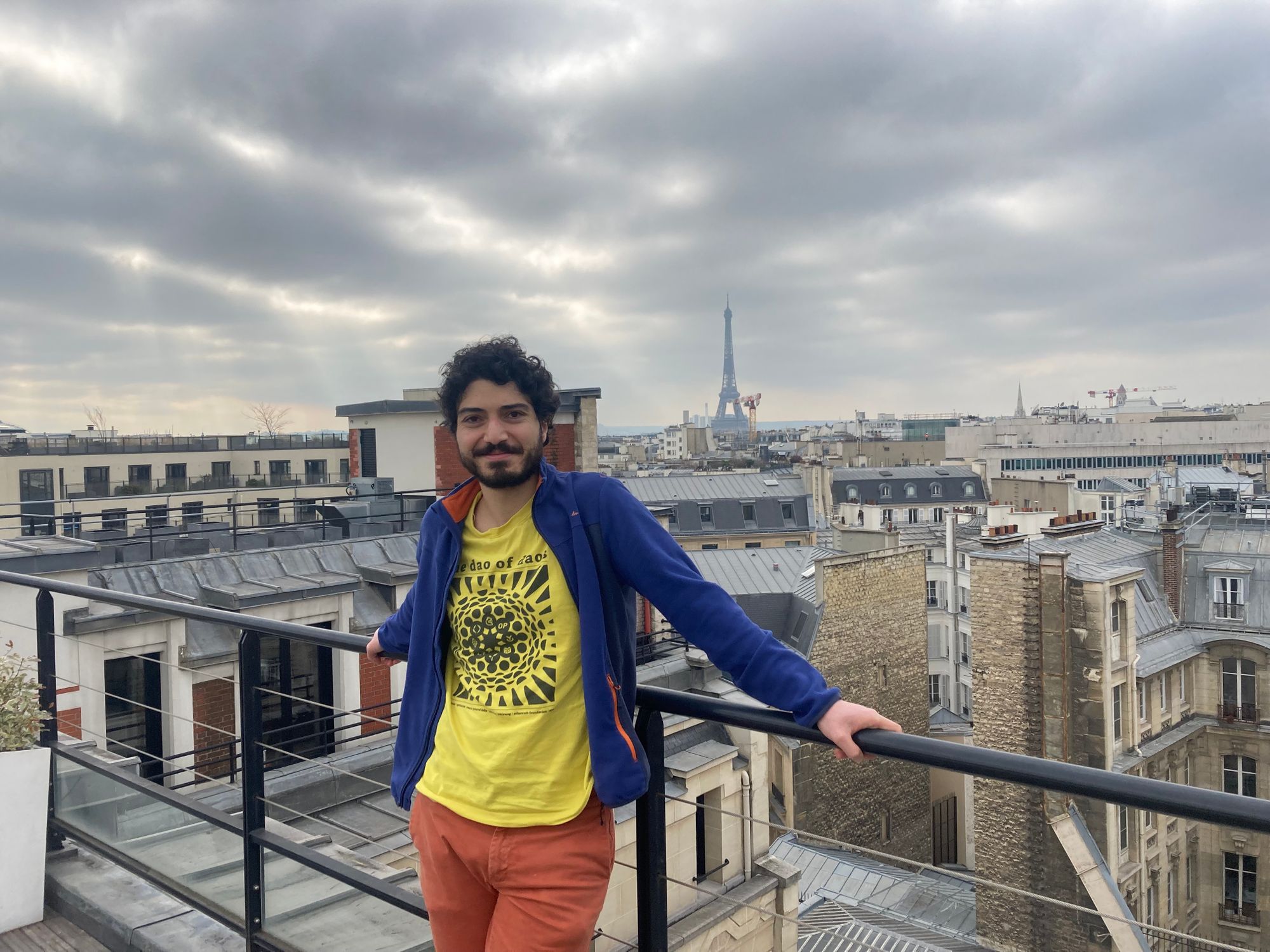Meet Yann, Kleros’ PhD candidate from the Paris Center of Law and Economics
Meet Yann, our PhD candidate from the Paris Center of Law and Economics and dive into the research he is conducting on the foundations of the concept of decentralized justice.

Yann is our PhD candidate, researching and testing the foundations of Kleros and formulating the scientific approach to decentralized dispute resolution.
Tell us a little about yourself.
I’m a PhD candidate at the Paris Center of Law and Economics in partnership with Cooperative Kleros. I was born and raised in the Paris suburbs. When I was a child, I was a quiet kid, spending a lot of time with friends in sport activities, specifically football. At that time I was also practicing a lot of chess in a club. Those were two of my massive occupations and the rest was quite a casual childhood, reading, visiting museums with my family.
During high school I studied science, got a Bachelor of Science with mathematics as a specialization. After that I went to the Toulouse School of Economics, where I initially studied math and economics, more precisely economics with an applied mathematics approach, much more than just literature of economics. Since I saw what I was studying as a full social field, not just applied mathematics, very soon I figured out that I wanted to work for projects and I liked the idea of startups. That led me to research law, as well. So, I graduated in economics and law with a double degree and decided to keep this heading moving forward.

I first did my master degree in law, since I wanted to get more skills in specifically business law. For the second year of my master’s I went back to the double degree of economics and law. This turned out into a combination of law and economic game theory. Using economic concepts and math to formalize law became my passion and that is the explanation why I’m now a PhD candidate in this field.
How did you get into blockchain and Kleros?
During the 2017 bull run, crypto got a lot of attention and I had the opportunity to go to a conference focused on blockchain. The focus of the conference was the technology behind Bitcoin and I found it interesting to separate cryptocurrency from blockchain. And there I was, hearing for the first time how this decentralized technology worked and what was the promise of public blockchains and I was impressed with the idea of removing the need of having a trusted third party to secure interactions that we have in the traditional world.
I found all of this very interesting and I understood that these things would fundamentally change and reframe our society and the ways we interact. I wanted to get involved and was thinking of a PhD, since I think it’s a good path to deep dive into something in a technical way. In the second year of my master’s I decided to do a PhD with my current PhD mentor, who was at the time the mentor of my master’s thesis. Naturally, we started to discuss different topics and he proposed that I cover the subject of blockchain in dispute resolution, more specifically Kleros, supported by Cooperative Kleros.
I wanted to do this partnership because it was an excellent opportunity to gather experience in both the public and private sectors, as well as get professional experience.
So, what do you do in Kleros?
My first role is working as a PhD candidate. My tests that I mentioned before have three perspectives. The first is to conceptualize what we call decentralized justice. It involves a discussion about what is justice in the field of decentralized justice. From an academic perspective, it’s not easy to talk about decentralized justice, it is required to frame what role justice plays in this new space.

The second perspective is questioning Kleros’ type of approach, more specifically testing the foundations of justice by calculus. The idea is to display and formalize the scientific approach of Kleros to dispute resolution. This ties in with the end result of my thesis, which is to show what decentralized justice technically means. Law has its traditional framework with the principle of law, as well as philosophy of law and obviously Kleros’ approach is absolutely disruptive in this regard. Despite its very different approach, the main question being posed is - does this approach really lead to justice? What would this justice mean?
The third perspective of my thesis is economic experiments, thinking of consensus in decentralized environment parameterization. I think one of the massive points of Kleros is the consensus and in scientific terms, what we would call Nash Equilibriums.
How do you see Kleros in five years?
To answer this question is quite a challenge because it’s important to first understand the evolving public blockchain ecosystem that is growing rapidly through a lot of innovation. At the same time, Kleros doesn’t just address this decentralized environment. Kleros also aims to address the traditional world by providing a fair, affordable protocol for dispute resolution. Basically, if you cannot reach traditional justice without costing you much time and money, Kleros aims to be an opportunity for you to resolve your dispute.
I think Kleros could be seen as a layer of security in this new decentralized paradigm as an efficient dispute resolution mechanism. Proof of Humanity also brings some valuable information about identity, as well. Decentralized digital identities come with massive challenges, but in the future it might truly become a staple in this new world. Perhaps in five or ten years, Kleros will become a way to bridge between many different partners and users. To this end, I feel we need to reach more scholars, students and traditional businesses, especially since Kleros has become the reference for resolving disputes.
What we want is remaining in a decentralized environment, strengthening the foundations, taking all opportunities that innovations bring and creating strong security value to both users and businesses. The Kleros way is not just imitating some legal mechanism but creating a novel, authentic approach to mechanism design.
What do you do in your free time?
I’m still big on sports, I swim and once a week I play football. I also still practice chess in a club. A lot of Saturdays and Sundays I play chess competitively. Apart from that, I spend time with friends. The PhD takes a lot of time, but I try to see my friends at least once a week outside the lab where I’m doing my thesis.
Any book recommendations, movies or other?
The first book that comes to mind is “Singularity is Near” by Ray Kurzweil. With the release of GPT-3 I think it’s quite a relevant book to read. It’s interesting to see how the most skilled people in the field of computing and new technologies think and imagine this singularity in the context of the likely exponential growth part of technological innovation curve. I very much enjoy reading in general, since France is known for its strong culture of reading. About movies, my favorite one is ‘Le Fanfaron’ made by Dino Risi. I think at the end this movie is an apology for living in the present moment.
I also suggest reading more about Kleros, as well. There are a lot of papers written on the topic that are easy to access and reflect upon. Materials that speak of Kleros as a social tool are quite enticing since Kleros, as a DAO dealing with justice speaks to the core of our society. It deserves to be lectured on in the light of philosophy, psychology. It’s significant enough to research in an academic and scientific environment. It’s necessary, there is not enough of it and we definitely need more of it.

